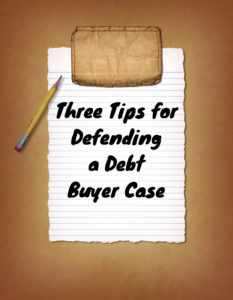By: Robert J. Nahoum
A knock on the door, you open up and are handed court papers. That knock was from a process server and as it turns out you’re being sued. You read the caption of the court paper and have no clue who this company is and why they are suing. You read further down the page and learn that you are being sued for allegedly not paying a debt. Confused – how can you owe then a debt if you’ve never heard of them before?
The reason you’ve never heard of this company is because, while you’ve never done business with them, they’re doing business with someone who knows you. There is an industry out there waiting in the shadows of traditional banks, credit card companies and doctors to buy up, for pennies on the dollar, portfolios of debt. These bottom feeders are called debt buyers and they make boat loads of money collecting old consumer debts from people like you.
In a debt collection lawsuit, the Plaintiff (the party bringing the lawsuit) always has the burden to prove that the defendant (the party being sued) is responsible for the debt. To meet this burden, a debt buyer must prove that: (1) it has the right to sue you; (2) the debt is yours; and (3) you owe the amount for which you were sued. It is never the burden of the Defendant to prove that he or she does not owe the debt.
Here are three tips for defending yourself against a debt buyer:
FIRST
Look for defects on the face of the complaint.  Do the parties all line up. Are you the actual person being sued or do they have you confused with someone else? Is the name of the debt buyer the same name in any supporting documents provided? If you’re in New York City, is the debt buyer licensed as a debt collection agent with the New York City Department of Consumer Affairs? You can check their license here.
SECOND
Look to see if the debt buyer has standing. In order to sue you, the debt buyer has to be the one who owns the debt. Examine the complaint and connect the dots to see if the debt was assigned from the original creditor to the debt buyer. Often, debts are sold and resold over and over again to a number of subsequent debt buyers. When this happens, the debt buyer must prove each and every assignment by showing a “chain of title†reaching all the way back in history to the original creditor.
THIRD
Look to see if the amount they claim you owe adds up. Examine how they calculated the amount, does it add up? Does the complaint break down principal, interest penalties and fees? If so, does the contract allow for it? If they have not provided a copy of the contract, ask for it.
WHAT YOU SHOULD DO:
If you’ve been sued for a consumer debt you should determine if you’re dealing with an original creditor or a debt buyer.  This distinction should guide the course you plan to take in dealing with the problem. With a debt buyer, you may have greater leverage in settling the debt than you do with an original creditor.
Also, debt buyers regularly violate the Federal debt collection laws called the Fair Debt Collection Practices Act (FDCPA), regulates the collection of consumer debts. The FDCPA precludes third party debt collectors from using false, misleading, deceptive and harassing debt collection tactics.  If a debt collector violates the FDCPA, you can sue for statutory damages up to $1,000.00 plus actual damages (like pain and suffering) and your attorney’s fees.
If you need help settling or defending a debt collection law suit, stopping harassing debt collectors or suing a debt collector, contact us today to see what we can do for you. With office located in the Bronx, Brooklyn and Rockland County, the Law Offices of Robert J. Nahoum defends consumers in debt collection cases throughout the Tristate area including New Jersey.
The Law Offices of Robert J. Nahoum, P.C
(845) 232-0202
www.nahoumlaw.com
www.BronxDebtDefense.com
www.BrooklynDebtDefense.com
www.NYDebtDefense.com
www.NJDebtDefense.com

